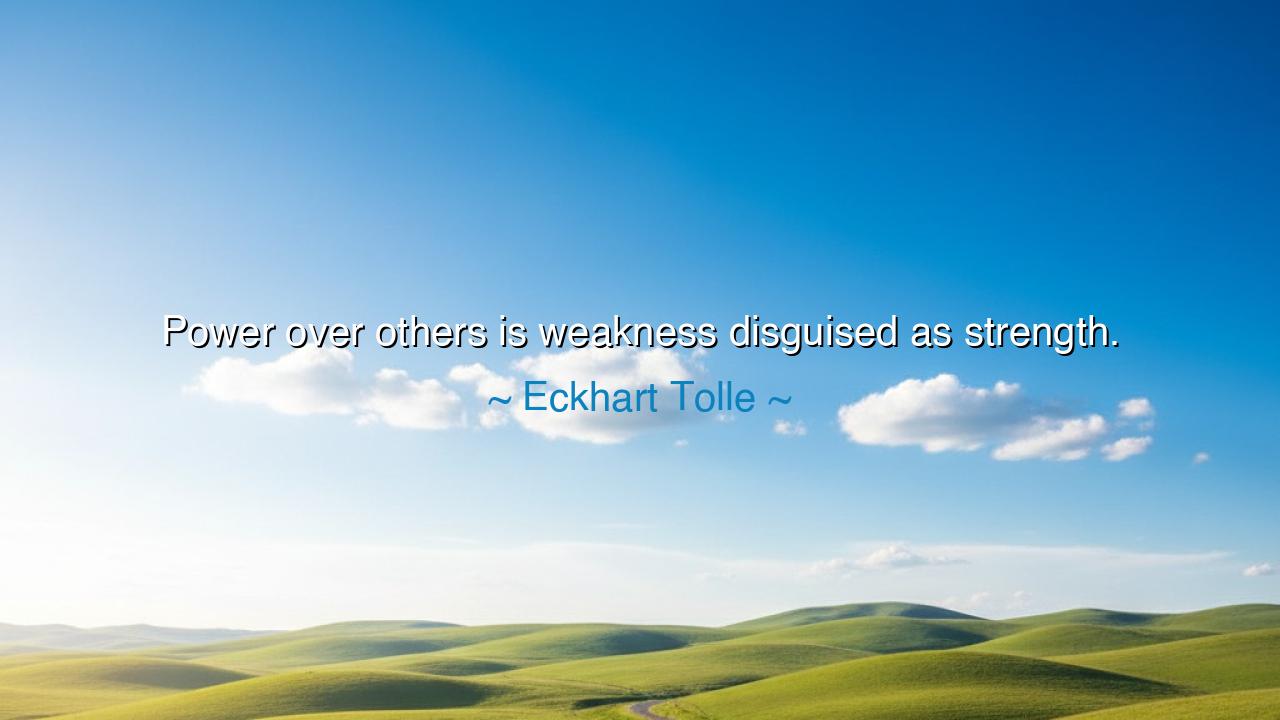
Power over others is weakness disguised as strength.






In the words of Eckhart Tolle we uncover a paradox that pierces through the illusions of the world: “Power over others is weakness disguised as strength.” This truth is sharp and unsettling, for it unmasks the false kings, the tyrants, and the boastful who mistake domination for greatness. True strength, Tolle reminds us, is not found in subjugating others, but in mastering oneself. To control another by fear or force may give the appearance of might, but in reality it is the desperate grasp of one who is inwardly fragile.
The ancients saw this truth etched in the rise and fall of empires. Consider the mighty Assyrian kings, who boasted of crushing their enemies, of binding captives in chains, of ruling with terror. For a time they seemed invincible. Yet their reigns were short-lived, their empires crumbled, and their names were remembered not with reverence but with dread. Their power over others was not strength, but rot—an inner weakness hidden behind walls of cruelty. For a man who cannot govern his own fear must always seek to dominate others, lest his hollowness be revealed.
In contrast, think of Marcus Aurelius, the philosopher-emperor. Though he commanded legions and ruled an empire, he wrote in his Meditations not of conquering others, but of conquering the restless self. He taught that anger, pride, and greed were the true enemies, and that real strength was the serenity of a mind in harmony with virtue. His reign, though turbulent, left behind wisdom that endures far beyond the conquests of harsher rulers. His life exemplifies Tolle’s vision: strength is not the chains you place upon others, but the peace you cultivate within.
History offers another lesson in Mahatma Gandhi. He led no armies, wielded no swords, commanded no prisons. Yet with nothing but conviction and truth, he moved millions and broke the hold of an empire. Britain had power over others, but Gandhi had strength. The empire eventually weakened under the weight of its false power, while Gandhi’s quiet force changed the course of a nation. In his life we see the ultimate contrast: domination is brittle; inner strength is unbreakable.
Tolle’s words teach us that weakness disguised as strength often wears the mask of arrogance. Those who seek control over others are often driven by fear—fear of irrelevance, fear of vulnerability, fear of facing themselves. By dominating others, they try to silence their own inner terror. Yet this is no strength; it is a sickness that feeds on illusion. True strength is gentle yet immovable, firm without cruelty, radiant without pride. It is the strength of one who does not need to conquer others to know their worth.
The lesson for us is clear: seek not to dominate, but to master. Rule not with fear, but with integrity. In your home, in your work, in your community, resist the temptation to prove your power by controlling others. Instead, cultivate the deeper force—patience, courage, humility, and compassion. For in these virtues lies a strength that no tyrant can match, and no empire can destroy.
Practically, this means turning the gaze inward. When you feel the need to assert control, ask yourself: am I acting from fear or from truth? Am I seeking to elevate myself by diminishing another? If so, pause, and remember Tolle’s wisdom. True leadership empowers rather than enslaves. True greatness uplifts rather than crushes. Let your power be the kind that liberates, not the kind that imprisons.
So remember, children of tomorrow: power over others is weakness disguised as strength, but mastery over the self is strength revealed in its purest form. Choose the strength that endures, not the weakness that pretends. For empires of domination fall like sandcastles before the tide, but the soul that is strong within itself stands eternal, unshaken, and free.






AAdministratorAdministrator
Welcome, honored guests. Please leave a comment, we will respond soon